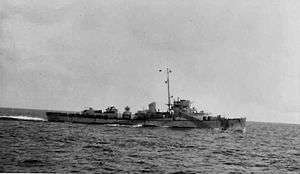HMS Blackwood (K313)
 HMS Blackwood | |
| History | |
|---|---|
| Name: | HMS Blackwood |
| Namesake: | Henry Blackwood |
| Builder: | Boston Navy Yard, Massachusetts, United States |
| Laid down: | 22 September 1942 |
| Launched: | 23 November 1942 |
| Commissioned: | 27 March 1943 |
| Identification: | Pennant number: K313 |
| Fate: |
|
| General characteristics | |
| Class and type: | Captain-class frigate |
| Displacement: | 1,140 tons |
| Length: | 289.5 ft (88.2 m) |
| Beam: | 35 ft (11 m) |
| Draught: | 9 ft (2.7 m) |
| Propulsion: |
|
| Speed: | 20 knots (37 km/h) |
| Range: | 5,000 nautical miles (9,260 km) at 15 knots (28 km/h) |
| Complement: | 156 |
| Sensors and processing systems: |
|
| Armament: |
|
HMS Blackwood was a Captain-class frigate of the Evarts-class of destroyer escort, originally commissioned to be built for the U.S. Navy. Before she was finished in 1942, she was transferred to the Royal Navy under the terms of Lend-Lease, and saw service during the Second World War.
Career
Blackwood was built by Boston Navy Yard, Massachusetts, United States and commissioned into the Royal Navy on 27 March 1943. She saw service on anti-submarine patrols and as a convoy escort. On 23 November 1943 she and the frigates HMS Bazely and HMS Drury sank the U-boat U-648 north-east of the Azores, and two days later on 25 November Bazely and Blackwood sank U-600 north of Punta Delgada.
Blackwood was part of the 4th Escort Group and was on patrol in the western approaches to the English Channel on 15 June 1944, covering ships bound for the allied invasion of Normandy when she was sighted by U-764, which fired a Gnat at her. Blackwood was hit and damaged, killing 57 of the crew. She was taken under tow, but foundered off Portland Bill the following day. The wreck lies in position Coordinates: 50°07′00″N 02°01′06″W / 50.11667°N 2.01833°W. in 60 meters (200 ft) of water, and is designated as a protected place under the Protection of Military Remains Act 1986.
References
- Colledge, J. J.; Warlow, Ben (2006) [1969]. Ships of the Royal Navy: The Complete Record of all Fighting Ships of the Royal Navy (Rev. ed.). London: Chatham Publishing. ISBN 978-1-86176-281-8. OCLC 67375475.
- HMS Blackwood at Uboat.net
- HMS Blackwood at Captain class frigate association
- MoD announcement of designation